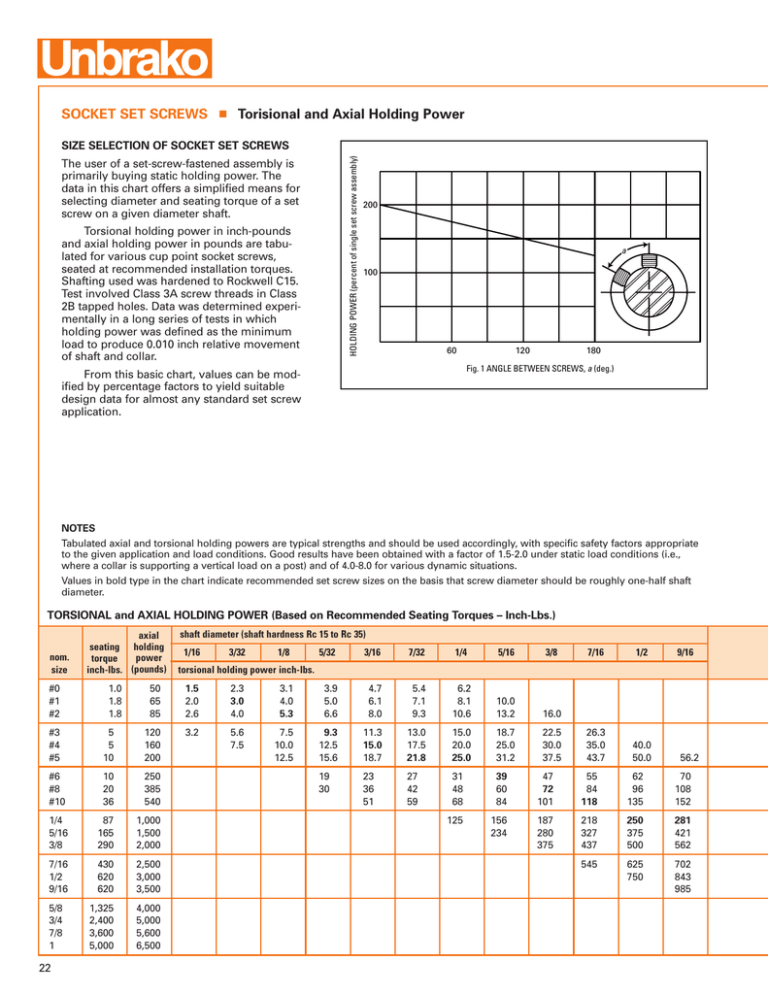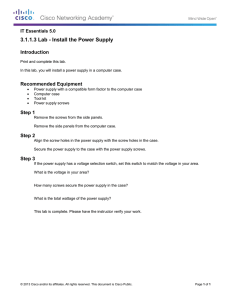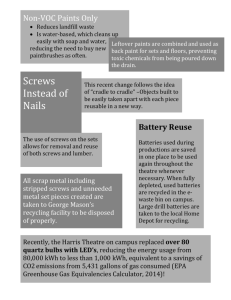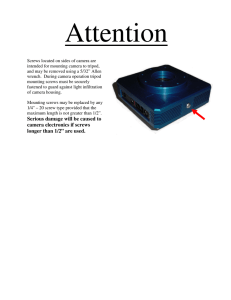Socket Set Screws Holding Power.
advertisement

SOCKET SET SCREWS n Torisional and Axial Holding Power HOLDING POWER (percent of single set screw assembly) SIZE SELECTION OF SOCKET SET SCREWS The user of a set-screw-fastened assembly is primarily buying static holding power. The data in this chart offers a simplified means for selecting diameter and seating torque of a set screw on a given diameter shaft. Torsional holding power in inch-pounds and axial holding power in pounds are tabulated for various cup point socket screws, seated at recommended installation torques. Shafting used was hardened to Rockwell C15. Test involved Class 3A screw threads in Class 2B tapped holes. Data was determined experimentally in a long series of tests in which holding power was defined as the minimum load to produce 0.010 inch relative movement of shaft and collar. 200 a 100 60 120 180 Fig. 1 ANGLE BETWEEN SCREWS, a (deg.) From this basic chart, values can be modified by percentage factors to yield suitable design data for almost any standard set screw application. NOTES Tabulated axial and torsional holding powers are typical strengths and should be used accordingly, with specific safety factors appropriate to the given application and load conditions. Good results have been obtained with a factor of 1.5-2.0 under static load conditions (i.e., where a collar is supporting a vertical load on a post) and of 4.0-8.0 for various dynamic situations. Values in bold type in the chart indicate recommended set screw sizes on the basis that screw diameter should be roughly one-half shaft diameter. TORSIONAL and AXIAL HOLDING POWER (Based on Recommended Seating Torques – Inch-Lbs.) nom. size #0 #1 #2 axial seating holding power torque inch-lbs. (pounds) 1.0 1.8 1.8 3/32 1/8 5/32 3/16 7/32 1/4 5/16 3/8 7/16 1/2 26.3 35.0 43.7 40.0 50.0 9/16 torsional holding power inch-lbs. 1.5 2.0 2.6 2.3 3.0 4.0 3.1 4.0 5.3 3.9 5.0 6.6 4.7 6.1 8.0 5.4 7.1 9.3 6.2 8.1 10.6 10.0 13.2 16.0 3.2 5.6 7.5 7.5 10.0 12.5 9.3 12.5 15.6 11.3 15.0 18.7 13.0 17.5 21.8 15.0 20.0 25.0 18.7 25.0 31.2 22.5 30.0 37.5 19 30 23 36 51 27 42 59 31 48 68 39 60 84 47 72 101 55 84 118 62 96 135 70 108 152 125 156 234 187 280 375 218 327 437 250 375 500 281 421 562 545 625 750 702 843 985 5 5 10 120 160 200 #6 #8 #10 10 20 36 250 385 540 1/4 5/16 3/8 87 165 290 1,000 1,500 2,000 7/16 1/2 9/16 430 620 620 2,500 3,000 3,500 1,325 2,400 3,600 5,000 4,000 5,000 5,600 6,500 22 1/16 50 65 85 #3 #4 #5 5/8 3/4 7/8 1 shaft diameter (shaft hardness Rc 15 to Rc 35) 56.2 SOCKET SET SCREWS Torsional and Axial Holding Power If you know set screws, you know that the tighter you can tighten them, the better they hold and the more they resist loosening from vibration. But there’s a limit to how much you can tighten the average socket set screw. If you’re not careful, you can ream or crack the socket, and in some cases, even strip the threads. So you’re never quite sure whether or not it will actually stay tight. With UNBRAKO set screws it’s a different story. A unique combination of design and carefully controlled manufacturing and heat treating gives these screws extra strength that permits you to tighten them appreciably tighter than ordinary screws with minimal fear of reaming or cracking the socket. this extra strength represents a substantial bonus of extra holding power and the additional safety and reliability that goes with it. Design – Deeper UNBRAKO sockets give more key engagement to let you seat the screws tighter. Corners are radiused to safeguard against reaming or cracking the socket when the extra tightening torque is applied. The sharp corners of other set screws create high stress concentrations and can cause cracking, even at lower tightening torques. By eliminating the corners, the radii distribute tightening stresses to reduce the chance of splitting to a minimum. Controlled Manufacturing – The fully-formed threads of UNBRAKO set screws are rolled under extreme pressure to minimize stripping and handle the higher tightening torques. Also, with rolled threads, tolerances can be more closely maintained. UNBRAKO set screws have Class 3A threads, closest interchangeable fit, giving maximum cross-section with smooth assembly. The thread form itself has the radiused root that increases the strength of the threads and resistance to shear. Controlled Heat Treatment – This is the third element of the combination. Too little carbon in the furnace atmosphere (decarburization) makes screws soft, causing reamed sockets, stripped threads and sheared points when screws are tightened. Too much carbon (carburization) makes screws brittle and liable to crack or fracture. The heat treatment is literally tailored to each “heat” of UNBRAKO screws, maintaining the necessary controlled Rc 45-53 hardness for maximum strength. Finally, point style affects holding power. As much as 15% more can be contributed, depending on the depth of penetration. The cone point (when used without a spotting hole in the shaft) gives greatest increase because of its greater penetration. The oval point, with the least contact area, affords the least. The cup point lies in between, but is by far the most commonly used, because of the wide range of applications to which it is adaptable. However, there is one cup point that can give you both a maximum of holding power and of resistance to vibration. It is the exclusive UNBRAKO knurled cup point, whose locking knurls bite into the shaft and resist the tendency of the screw to back out of the tapped hole. The chart on this page shows clearly how much better the UNBRAKO set screws resist vibration in comparison with plain cup point set screws. UNBRAKO knurled cup point self-locking set screws give you excellent performance under conditions of extreme vibration. UNBRAKO SOCKET SET SCREWS – UNRC or UNRF Thread – Seated Against Steel Shaft nom. size #0 #1 #2 axial seating holding torque power inch-lbs. (pounds) 1.0 1.8 1.8 shaft diameter (shaft hardness Rc 15 to Rc 35) 5/8 3/4 7/8 1 1 1/4 1 1/2 1 3/4 2 2 1/2 3 3 1/2 torsional holding power inch-lbs. 50 65 85 #3 #4 #5 5 5 10 120 160 200 62 #6 #8 #10 10 20 36 250 385 540 78 120 169 94 144 202 109 168 236 192 270 338 1/4 5/16 3/8 87 165 290 1,000 1,500 2,000 312 468 625 357 562 750 437 656 875 500 750 1000 625 937 1250 750 1125 1500 1310 1750 1500 2000 7/16 1/2 9/16 430 620 620 2,500 3,000 3,500 780 937 1090 937 1125 1310 1095 1310 1530 1250 1500 1750 1560 1875 2190 1875 2250 2620 2210 2620 3030 2500 3000 3500 3125 3750 4370 4500 5250 6120 1,325 2,400 3,600 5,000 4,000 5,000 5,600 6,500 1250 1500 1875 1750 2190 2620 2000 2500 3000 3500 2500 3125 3750 4375 3000 3750 4500 5250 3750 4500 5250 6120 4000 5000 6000 7000 5000 6250 7500 8750 6000 7500 9000 10500 7000 8750 10500 12250 5/8 3/4 7/8 1 4 8000 10000 12000 14000 23



